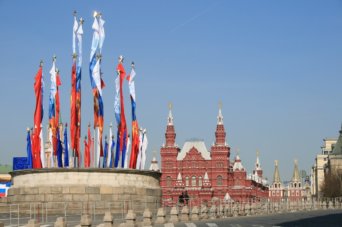- About
- Topics
- Story
- In-Depth
- Picks
- Opinion
- News
- Donate
- Signup for our newsletterOur Editors' Best Picks.Send
Read, Debate: Engage.
| topic: | Humanitarian Aid |
|---|---|
| located: | Russia, USA, Serbia |
| editor: | Igor Serebryany |
A Russian air force plane landed in New York City last Wednesday carrying 60 tons of facemasks and lung ventilation equipment onboard. The delivery came days after President Donald Trump spoke by phone with his Russian counterpart, Vladimir Putin. The most ironic fact is the delivery was provided by a Russian company under the U.S. sanctions.
This was another gesture of Russian authorities who dispatched a 100-man team of military biologists to Italy in March to help the virus-affected nation to tackle the pandemic. Russia also sent smaller reinforcement to Serbia.
By Wednesday, April 8, the number of registered COVID-19 cases in Russia amounted to 7,500 with nearly 60 people reported to have passed. Moscow and Saint-Petersburg are topping the list of the worst-affected cities.
Despite the relatively low numbers, Russian regional authorities introduced strict quarantine measures in many cities. The Russian public has been unhappy that the masks, human resources and equipment have been sent abroad while the country faces a dire shortage of those. In many hospitals throughout Russia personnel has to stitch makeshift face masks in their spare time.
While sending the medical supplies abroad, the Russian authorities prevent its citizens from self-organising for countering the pandemic. Last week, police in Nizhny Novgorod region stopped a caravan carrying masks purchased by the Doctor Alliance for distribution among the local hospital personnel. Police confiscated the masks and fined the activists "for violation of the quarantine regime".
Another outcry was caused in the country when information has leaked that the "humanitarian aid" for the U.S. was not a hearty gift but sold for money.
This is how Putin deals internationally: his assistance has nothing to do with charity but is a well-calculated operation, director at the Social Anthropogenesis Research Institute Oleg Chagin assumes.
"We can look forward to the arrival of the Russian military teams to the US like it happened in Italy. I'm only afraid those teams will spray the American cities not only with the anti-virus reagents but with pro-Kremlin propaganda", he says.
People in Russia are asking if it is a waste of resources badly needed in this country itself, political expert Andrei Baranov says. "Pro-Kremlin media brainwash people that the West has been trying to humiliate Russia with sanctions. So people now question why the same Kremlin is offering assistance to the 'enemies' in hard times", he explains.
The underlying reason why the Kremlin might demonstrate such "generosity" is that it attempts to beef up Russia's "soft power", the expert suggests.
"Many Italians and Americans see Russia's goodwill and make conclusions. The Kremlin hopes its conclusion will be instrumental during upcoming presidential elections in the United States. So the expenses will be paid off", he says.
On the other hand, some local experts call not to nurse big hopes that Russian assistance would mend relations between Moscow and the West.
After the pandemic ends, the U.S. will accuse Russia of insufficient aid, director of the International Institute of the Newest States Alexei Martynov is certain. "Trump's gratitude for the medical supply is temporary. After the danger passes, the West will resume its anti-Russian stances", he forecasts.
He believes that the Kremlin's expectations that the U.S. would return Russia's "love" one day are ungrounded.
Image by Lynn Greyling

